
Call for
social change
- Padma Jayaraj,
Thrissur
e-mail: padmajayaraj@gmail.com
February 20,
2009
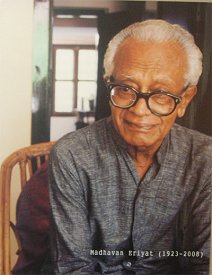 In
an age when life and arts have grown complex, the paintings of Madhavan
Eriyat, a memorial show, in Durbar Hall Art Gallery, Kochi is a refreshing
whiff of wind. Simplicity is his signature and straight forward is the
narrative evoking nostalgia for a vanishing mode of expression. In
an age when life and arts have grown complex, the paintings of Madhavan
Eriyat, a memorial show, in Durbar Hall Art Gallery, Kochi is a refreshing
whiff of wind. Simplicity is his signature and straight forward is the
narrative evoking nostalgia for a vanishing mode of expression.
As the title
suggests, the show paints the vision of a freedom fighter: ideal India,
ideal youth, and the dreams of a forgotten generation. Oil paintings, painstakingly
done, create a sober atmosphere and sombre mood. No flashy colours. Green,
shades of ochre and yellow with blue, paint the backdrop. Motives of binary
opposites in muted forms suggest the philosophy of the artist. Even rocks
carry the imprint of human faces. Populous India seems to be the concern
of the artist.
As a young
man, Madhavan Eriyat fought for the freedom of his country. Born in Kerala
in 1923, the freedom fighter found himself in jail in 1942 when barely
twenty. After independence, he set out to build a career in advertising
in Bangalore and Bombay, specialised in graphic art and Typography. In
1989, he came home and started painting to fulfil a childhood urge. He
passed away last November. His paintings are not for sale. And it is the
first exhibition of his work, put up by his nephew Suresh Eriyat as a memorial
show.
His paintings
hold an introvert's silent message for social change. A huge canvas greets
you. It affirms the need for peace. Soldier surrenders, an innocent lady
is in the focus. A bird sits on his gun as if it is a twig and his helmet
has turned into a potted plant. A snake and a mongoose are lying side by
side. Shades of yellow indicate the dawn of a new era.
'Arms down...'
is a recurring gesture in many of his works. And we think of our planet
threatened by the arms race.
Religious
harmony is a strong theme that runs through all his pieces. Motives of
three dominant religions of India linger in the background and binary opposites
speak of co-existence. 'Prayer Time' show cases a Hindu, Muslim and Christian
praying. It's man's urge to pray. And an animal has two heads, that of
a cow and of a tiger! Coexistence is emphasized. The lines that suggest
the figure of Mahatma Gandhi over the figure in focus, chronicles the history
of the freedom struggle. Hindus and Muslims had flocked to the call of
the Mahatma. But now, that unity is coming apart with individuals returning
to the comforts and insularities of the communities and politicians trying
to exploit their sentiments.
"He was greatly
pained at the emerging situation when Babri Masjid fell," recalled Suresh.
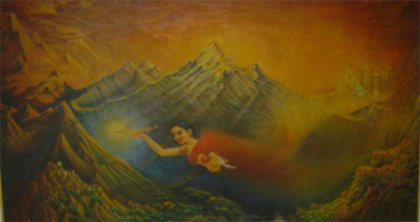 Dawn of freedom
Dawn of freedom
|
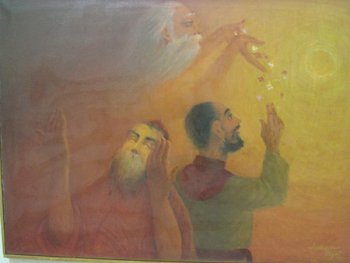 Prayer time
Prayer time
|
Slowly we find
an evolution in the artist's thought and philosophy. In 'Harvest,' we find
the joy of hard work. 'Work is worship' seems to be the underlying thought
that brings about a new dawn. 'Monument of Unity' points to humanism as
the core religion - temple, mosque and church fade away.
There are
other themes too. 'Butterfly' indicates deforestation, 'Greenery on the
Rocks' forestation. 'Nuclear Energy' speaks of his hopes. His paintings
reflect contemporary concerns.
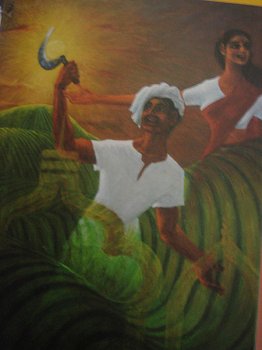 Joy of work
Joy of work
|
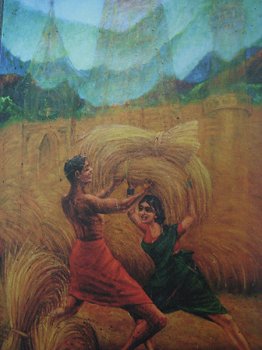 Harvest time
Harvest time
|
An egalitarian
world where girls and women render colours to the joys of life is the artist's
vision. 'Towards Wisdom,' 'Safe Hands,' 'Family' portray the mores
of life in India. And the quiet of the rural landscape pulsate with energy;
humans in harmony with Nature; quite flows the river of life.
Here is an
artist who dispassionately thinks of human nature and its various attributes
set against the pastoral charms. 'The Flautist' is inspired by Nature.
'Veena' sings songs of Nature. 'Fancy' is a charming portrait of Nature
in human form. 'Nature's Song' has an obvious message: the mature
lady passes her message to the young girl. 'Music Enthrals' tells how music
knows no boundaries. Mr. Eriyat's background was musical as well. He used
to enjoy both classical music and dance.
In his autumnal
days with a brush in his hand, the artist seems to have thought more of
our nation's failures. And hence his message is to wake up, to think, and
to act.
Padma
Jayaraj is a freelance writer and a regular contributor to www.narthaki.com
|

